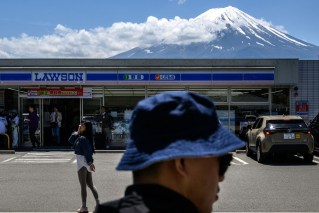Travellers shouldn’t expect cheaper tickets or better service after Qantas’ $1.7 billion profit

Experts say travellers shouldn’t expect to see better service or cheaper flights after Qantas posted a post-tax profit of $1.7 billion during a cost-of-living crisis.
Increased demand for domestic and international flights, decreased capacity and high airfare prices have all contributed to the bumper $2.47 billion pre-tax profit, but the national carrier doesn’t “have an incentive” to pass the savings onto consumers or employees.
Rico Merkert, deputy director of the University of Sydney’s Institute of Transport and Logistics Studies, said even before the COVID-19 pandemic, the aviation industry ran on tight margins.
“Even Qantas had quite a bit of fighting going on domestically, where they oversupplied the market and were really after the market share,” he said.
“Now, we see low-cost carriers bouncing back more strongly.”
Qantas announced it will order 12 more Boeing 787s and 12 Airbus 1350s, initiate a $500 million share buyback and set aside $340 million for staff bonuses.
Gui Lohmann, a researcher with the Griffith Institute for Tourism, said the competitive nature of the industry means this is a “one-off period for many airlines”.
“The quality of service that Australians are used to with a premium carrier like Qantas, it’s simply not there any more,” he said.
“The airlines are a lot more conscious of the bottom line and they are trying to recuperate the losses that they had during the pandemic.”
Price and service
The diminishing quality of Qantas’s service has been a sore point for the airline, with the ACCC reporting a 68 per cent increase in complaints throughout 2022 because of cancellations, delays and lost luggage.

Qantas outsourced baggage handling during the pandemic. Photo: AAP
Shane Zhang, professor of aviation at University of South Australia, said consumers shouldn’t expect to benefit from a strong year for the airline.
“They don’t have an incentive to pass on the profit to consumers or to employees,” he said.
“Given the capacity, it would not be able to keep up with high demand and I think people will have to pay a higher fare to have a seat.”
Qantas posted losses of more than $7 billion across 2020, 2021 and 2022, but a 132 per cent increase in traffic helped drive its first profitable year since before the pandemic.
Professor Merket said the future prices for flights will depend on Australia’s economic outlook and people’s demand for travel.
“It all depends on whether we see a soft recession or a really bad recession. If it is the former, then I suspect things will normalise somewhat and that corner will still enjoy healthy profits,” he said.
“I found it surprising they yet again announced a share buyback of $500 million. That’s something where I wonder if perhaps they should have kept that money as a buffer or reinvested it.”
Although Qantas announced sales fares and bonus points for customers as a “thank you”, Professor Merket said a huge factor in the company’s profit was “pent-up demand”.
“I’ve heard some indications that suggest people are starting to cut back on holidays already due to high interest rates and inflationary pressures,” he said.
“If it continues, that will have an impact both domestically and internationally.”
What about the employees?
During the pandemic, Qantas cut nearly 10,000 jobs – including 2000 baggage handlers – and created chaos throughout Australian airports, despite receiving $856 million in taxpayer money through the JobKeeper scheme.

Qantas was the biggest recipient of the Morrison government’s JobKeeper program. Photo: AAP
The airline recently committed to hiring 2300 new pilots, crew members and engineers by the end of 2024.
Australian Council of Trade Unions president Michele O’Neil said Qantas has a responsibility as the country’s flagship carrier to treat workers with respect and not drive down pay and conditions.
“Qantas owes a great debt to the Australian public for the billions of taxpayers dollars it received,” she said.
“Instead of the relentless pursuit of increased profit above all else, the very least they should do is make sure their workers have good, secure well-paid jobs and deliver customers quality service.”
Qantas employees have been ‘rewarded’ with $340 million in bonuses for more than 21,000 staff, equalling an average of about $1620 each in shares, travel credits and bonuses.
Mr Lohmann said employee morale in the airline sector is “low in many ways”.
“It hasn’t been an easy environment for a lot of workers coming back,” he said.
“It will be interesting to see if the brand is compromised, but I believe Australia still sees Qantas as their national carrier and a symbol of their home away from home.”








